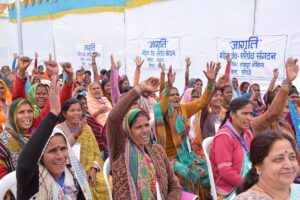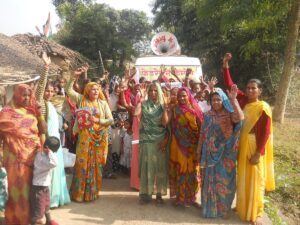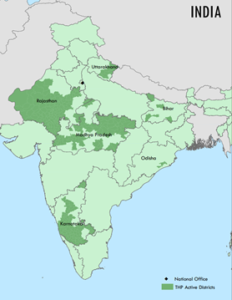India
India has made significant progress in human development over the past 60 years, but the prosperity gains of the growing economy are unequally distributed: One third of the world’s poor live in India.
In addition, gender discrimination, female infanticide and gender-selective abortion are part of everyday life. This shows a systematic devaluation of women and girls in society. In addition, a strong patriarchal control over political and social processes is widespread due to the caste system.
According to the 73rd state constitutional amendment of 1992, one-third of mayoral mandates in India are reserved for women. In some Indian states even the 50 % quota applies. This is a revolutionary step with enormous consequences. For the first time, women have, at least in principle, the mandate and the political influence to stand up for their concerns with the villagers and to mobilize the resources of the state for this purpose. However, implementing this law in practice is a great challenge. Deep-rooted, patriarchal and feudal structures often stand in the way.

Recent successes
Thanks to your support for our Empowerment Program we have been able to achieve a lot in India recently. In 2019 THP Global supported 1,577 local mayors, so-called “panchayats”, in 6 states and 42 districts. A total of 6,856,977 people were able to benefit from our work.
THP Switzerland also supports these efforts in India time and again. For example, in 2017 the THP programme in Rajasthan was supported with 21,000 CHF, which benefited 1,050 mayors. With the support of THP India, these mayors were able to identify and address weaknesses in their leadership activities and other needs of the community. The mayors are thus empowered to improve access to and use of basic services.
The focus was on the following basic services in Rajasthan in 2017, for example:
- Food and nutrition: Distribution of cereals to the poorest and the provision of a nutritious lunch for primary school children
- Day care places
- Education for girls
- Water and sanitary facilities in schools
- Accommodation for the poorest with a specific focus on women
- Infrastructure that is essential for the further development of the community. This includes roads, electricity and water.
In addition, various meetings between mayors and members of parliament took place in the example year 2017. These meetings allow the mayors to share their experiences and to convince them of the challenges specific to their region. In particular, the mayors were confronted with the following challenges, whose solution required the support of the members of parliament:
- Education/schools: Lack of science subjects and teachers;
- Lack of panchayat secretaries in certain panchayats. This position is essential for the support of the mayors;
- Abolition of the 2-child policy in Rajasthan;
- Elimination of alcohol stores from the public space;
- Compensation payments to farmers for crop losses due to flooding;
- Establishment of a university;
- Lack of drinking water facilities.

Travel reports
Report on the Mission to THP India September 2014 (pdf)
Photos of the Mission to THP India September 2014 (pdf)
Report on the Mission to THP India January 2012 (pdf)
Photos of the Mission to THP India January 2012 (pdf)
THP sites in India

Home > Who we are > THP Switzerland > India
India
India has made significant progress in human development over the past 60 years, but the prosperity gains of the growing economy are unequally distributed: One third of the world’s poor live in India.
In addition, gender discrimination, female infanticide and gender-selective abortion are part of everyday life. This shows a systematic devaluation of women and girls in society. In addition, a strong patriarchal control over political and social processes is widespread due to the caste system.
According to the 73rd state constitutional amendment of 1992, one-third of mayoral mandates in India are reserved for women. In some Indian states even the 50 % quota applies. This is a revolutionary step with enormous consequences. For the first time, women have, at least in principle, the mandate and the political influence to stand up for their concerns with the villagers and to mobilize the resources of the state for this purpose. However, implementing this law in practice is a great challenge. Deep-rooted, patriarchal and feudal structures often stand in the way.

Recent successes
Thanks to your support for our Empowerment Program we have been able to achieve a lot in India recently. In 2019 THP Global supported 1,577 local mayors, so-called “panchayats”, in 6 states and 42 districts. A total of 6,856,977 people were able to benefit from our work.
THP Switzerland also supports these efforts in India time and again. For example, in 2017 the THP programme in Rajasthan was supported with 21,000 CHF, which benefited 1,050 mayors. With the support of THP India, these mayors were able to identify and address weaknesses in their leadership activities and other needs of the community. The mayors are thus empowered to improve access to and use of basic services.
The focus was on the following basic services in Rajasthan in 2017, for example:
- Food and nutrition: Distribution of cereals to the poorest and the provision of a nutritious lunch for primary school children
- Day care places
- Education for girls
- Water and sanitary facilities in schools
- Accommodation for the poorest with a specific focus on women
- Infrastructure that is essential for the further development of the community. This includes roads, electricity and water.
In addition, various meetings between mayors and members of parliament took place in the example year 2017. These meetings allow the mayors to share their experiences and to convince them of the challenges specific to their region. In particular, the mayors were confronted with the following challenges, whose solution required the support of the members of parliament:
- Education/schools: Lack of science subjects and teachers;
- Lack of panchayat secretaries in certain panchayats. This position is essential for the support of the mayors;
- Abolition of the 2-child policy in Rajasthan;
- Elimination of alcohol stores from the public space;
- Compensation payments to farmers for crop losses due to flooding;
- Establishment of a university;
- Lack of drinking water facilities.

Travel reports
Report on the Mission to THP India September 2014 (pdf)
Photos of the Mission to THP India September 2014 (pdf)
Report on the Mission to THP India January 2012 (pdf)
Photos of the Mission to THP India January 2012 (pdf)
THP sites in India


